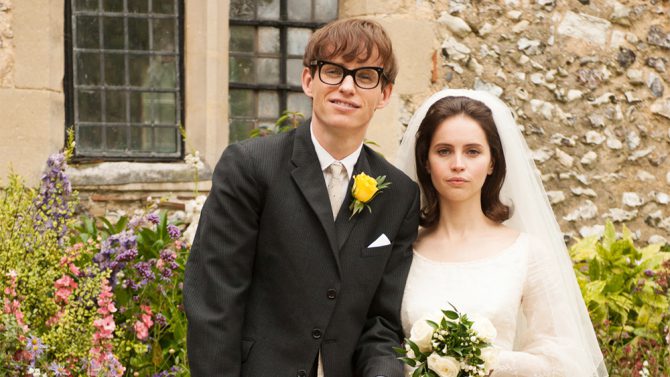I am usually drawn to biopic films on the whole. I admire any actor’s attempt to become another, real-life person, and for their willingness to be overly-critiqued for taking on said part. More often than not, we unabashedly pick out the flaws in the performance since, well, since exists a literal person to reference against. And I was getting ready to do just that when I watched the trailer for the new Stephen Hawking biopic, The Theory of Everything. The trailer, as did the film, left me with visible chills down my arms; in fact, this is not just another typical biopic. Powerhouse performances from its lead actors, beautiful camerawork, and palpable emotional intensity make this film so much more.
The Theory of Everything begins when young Stephen, (Eddie Redmayne, delivering a revelatory performance) meets young Jane (Felicity Jones) at a University gathering. Wide-eyed and naive, the two quickly and early on fall in love. It is a case of “opposites attract”-Jane being an artistic and religious girl and Stephen being the nerdy astrophysicist and atheist, the couple soon discover their chemistry and future will know no bounds. But with a sudden (and subtly built) diagnosis of motor neuron disease (ALS, or, Lou Gehrig’s disease) at 21 years old, with a diagnosis of having only two years left to live, Jane doubles down on her commitment to him, and the pair are soon married, with children to come, as Hawking continues to work towards his life’s educational purpose- discovering an equation to explain the creation of the universe as understood by time’s mathematical properties. His motivation to determine the relationship between space and time keeps him distracted from his debilitating disorder, but it’s easy to see that it is Jane’s love and support that keeps him alive.
Redmayne in this film is like Michael Jordan in the NBA Finals-I was awestruck at the execution and mastery on display. His portrayal of an aging and debilitating Hawking, one of the smartest men in history, is exacted and fully realized. His look, his mannerisms, his body language, and the light in his eyes, with complimentary soft-lit lighting and gorgeous camerawork to add, seems so personable and true. Redmayne is undeniably charming, his cuteness coupled with his raw talent makes him extremely attractive to watch onscreen. As Hawking grows older, his body continues to deteriorate and worsen, but his mind is still very much alive. Redmayne captures this challenging period in time with real bravado; he finds the humor in the grim, the joy in the sadness, and the brilliance in the silence.
Redmayne captures this moment so well; he finds the humor in the grim, the joy in the sadness, and the brilliance in the silence.
Not to be outdone is Felicity Jones, who grounds the film with her selflessness and agitated yet calm demeanor. She is relatable as a woman who commits as the caretaker, who stays with the love of her life despite the bleak outlook on their future together, not in the least of times when they bring in a Church music teacher Jonathan (Charlie Cox) to assist with Stephen and the family’s life. Jane is a woman to be admired, and Felicity plays her with poignant sensitivities and warmth, driving the film ever forward.
To praise for this ambitious and heart-driven attempt is director James Marsh, whose previous films include documentary work such as 2009’s Best Documentary winner Man on Wire. His approach to the film primarily focuses on the lovely, yet complex relationship between Stephen and Jane; his academic achievements and growing successes are circled back to, but it is not a distraction to the focal point of the film. Marsh humanizes the man we have all come to know as a somewhat mythical figure in history and paints him in a new, more vulnerable and unseen light. Much to our delight, this film isn’t a giant history lesson meant to educate audiences about the work of Stephen Hawking; but rather, to give us a realistic look into his personal life.
Marsh could have easily turned The Theory of Everything into a grandiose, superficial film with the motivation to rack up countless awards, especially with such a grand title. Luckily for us, this film disposes of superficiality in all the best ways. In fact, the storyline is extremely accurate (and had the blessing from the real Hawking himself). The accompanying score by composer Jóhann Jóhannsson is the threaded heartbeat of the film, cinematic enough to transport us to another place and time, but not so apparent that it takes away from the film itself.
The Theory of Everything has all of the right components to be acknowledged come this awards season: an Oscar contender in many categories for sure. There’s no doubt in my mind that Redmayne will receive praise for his work as Hawking. With all of this praise comes some critique; rushed storylines and incomplete emotional journeys cause the film to fall just short of perfection. With so much invested in our characters, it seems an injustice to rush them, although I understand Marsh’s decision given the film’s 2 hour run time. Overall, I am extremely proud of the film and Eddie Redmayne himself, whose career I’ve followed since the beginning. Yes, I’ll admit it, a couple tears came to my eyes during one particular scene where, in the film’s final act, Hawking tells Jane he is traveling to America, a sign of their ultimately distancing between them. If there’s anyone who doesn’t shed a single tear during that scene, please comment below. I’d love to know how that is humanly possible.
The Theory of Everything opens in theaters this Friday.
Morgan Rojas
Certified fresh. For disclosure purposes, Morgan currently runs PR at PRETTYBIRD and Ventureland.

